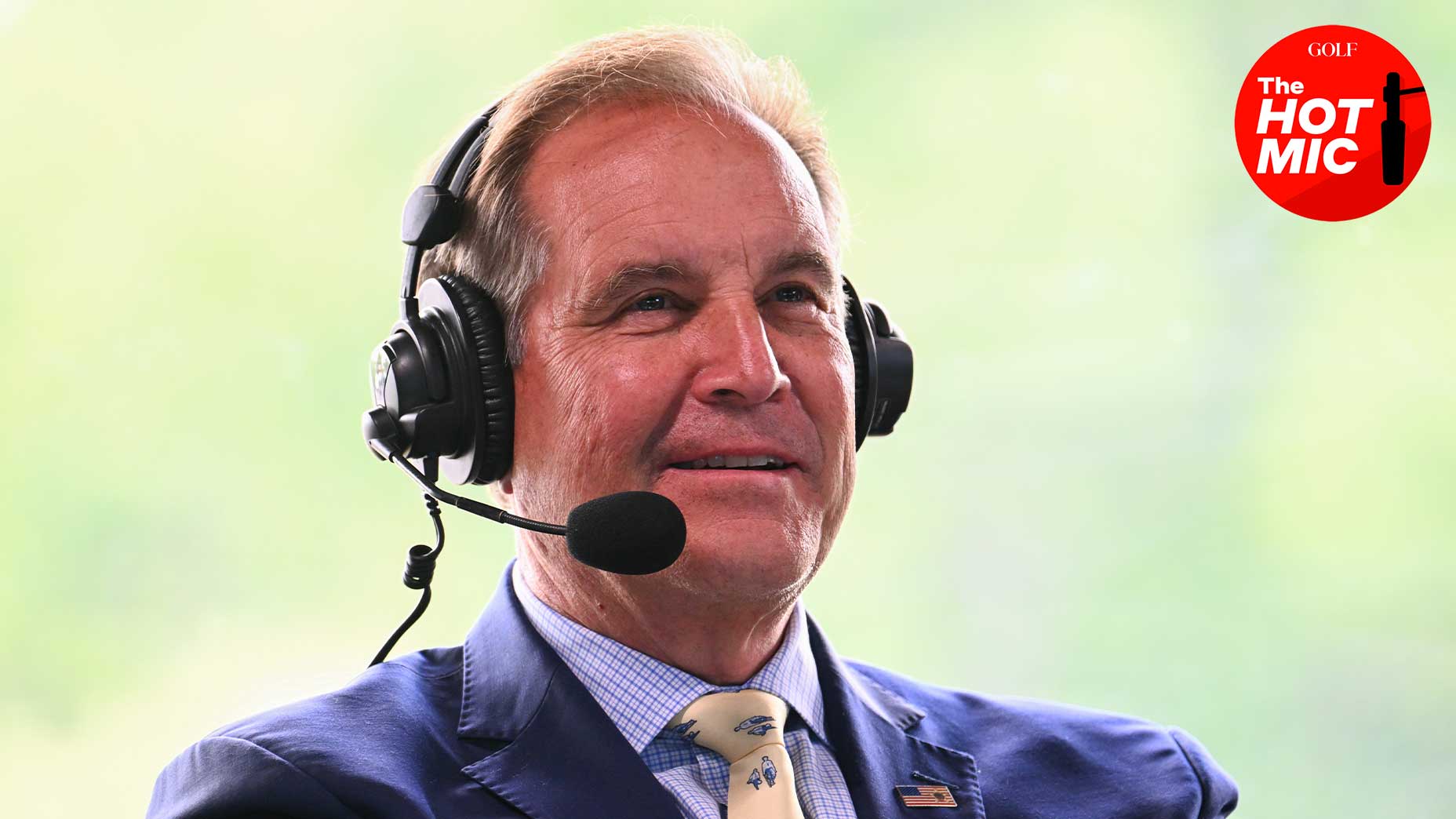Jim Nantz will call the Super Bowl on Sunday in Las Vegas.
Getty Images/Chris Condon
If prognostications (and betting lines) prove correct, Jim Nantz’s voice will be heard by more Americans this weekend than any sports broadcast in the history of television.
The Super Bowl, which Nantz will call for CBS for the seventh time this weekend, seems to reset the feat of “most-watched sports telecast ever” every few years — and with Patrick Mahomes and Taylor Swift as starring characters in this iteration, Super Bowl LVIII seems primed to break the record yet again. In the days preceding the big game, experts guessed the final number would fall roughly around 120 million average viewers (roughly 10 Masters), while the betting markets set the over/under even higher, around 122 million. Perhaps the ubiquity of the Super Bowl removes some luster from Nantz’s accomplishment, but we think it doesn’t. Consider some of the historical moments this weekend’s big game audience will eclipse: Nixon’s resignation (!), the fall of the Berlin Wall (!!), the assassination of John F. Kennedy (!!!), OJ and the white Ford Bronco (!!!!), Tiger at the ’19 Masters (!!!!!) — we could go on.
The point is that if the predictions are true, Nantz will add his voice to another piece of television lore on Sunday evening, something he’s done over and over again for the better part of the last four decades. When Jim Nantz speaks, America listens — and on the topic of golf broadcasts? Well, we’d recommend they listen closely.
As was first detailed in the Hot Mic Newsletter a few weeks ago, we asked Nantz to take us through his vision of a “good” golf broadcast, and he had lots to share.
“I consume a lot of golf television,” Nantz told GOLF. “What I’m looking for, really, it’s one measuring stick: Does it make me wish I was there? I know there are a million critics out there who have found a community where they can sit and complain with one another about how they think things should be done. I’m so far on the opposite end of that.”
The discourse surrounding golf’s TV product has charitably been a cesspool over the last decade. Fans infuriated by the commercialization and creative obfuscation of golf TV have taken to social media repeatedly to voice their frustrations with golf’s two primary networks, NBC and Nantz’s CBS.
It’s fair to say that many of those criticisms have been warranted, as even golf’s top brass agrees. Over-commercialization, overemphasis on promos and other filler, and underrepresentation of live-action have become talking points for commissioners (of both the USGA and PGA Tour), players and in some cases, even broadcasters. In recent years, these issues have contributed to considerable staff turnover for both networks.
But it’s also fair to point out that some of the criticism has gone beyond constructive, transforming at times into a uniquely social media-driven void of vitriol and antagonism. Nantz gets it, but he’s grown frustrated with what he sees as a predatory attitude from some in the audience.
“Even as I watch people produce golf television on other networks, I don’t see the blemishes that everyone else sees. I really don’t,” he said. “I think it’s nitpicky. It’s a b-tchfest, and people find comfort in that. I find comfort and getting lost in a golf telecast.”
Nantz immediately apologized for his language, but his larger point deserves some deeper reflection. Is it possible, as he says, that our expectations for golf TV have become overinflated? And if so, what should our expectations be?
“I’m looking for coverage that is that takes me there,” Nantz said. “Coverage that gives me a cinematic experience. I’m looking for storytelling that gives me a rooting interest in the subjects that I’m watching. I’m looking for great competition. I want to feel like I’m there, because I can’t be. That’s what I want to experience as a consumer.”
Now, some golf fans would surely argue that their interests are aligned with Nantz’s; that part of the problem with modern golf television is that the number of interruptions has made it impossible to be transported. These are valid critiques, though Nantz says they miss the broader point: golf television is getting better, just perhaps not in the ways fans are looking for.
“I think it’s a lot more complex to be able to deliver [golf] to people than a lot of folks know,” he said. “And the nuance that goes into production that scattered over 200 acres or more, it’s amazing what people pull off now and how far the coverage has gone — how far it’s advanced with technology and innovation.”
Of course, there’s here’s a deeper layer of irony in all of this. The truth is that CBS’s product has gotten better over the last half-decade, implementing a slew of improvements that have made golf television feel faster and more agile and bigger. And how was CBS capable of doing this? In part by listening to the fans!
It isn’t that the fans are wrong. After all, the customer is always right. Rather, it’s important to know when to listen. Sometimes, as CBS learned firsthand, fans can be a sorely needed source of reflection. And sometimes they can just be a sore.
“It’s a long way of saying [that] I love golf television. I’m all in on it,” he said. “I think people do it really well. Really, really well. I say that about my competitors too. When we’re not doing it, I enjoy watching it and I am not looking for mistakes.”
You can reach the author at james.colgan@golf.com. To receive exclusives like this one long before they reach the web, subscribe to the Hot Mic Newsletter below.



